Get all Attributes or Methods of an Object in Python
Last updated: Apr 10, 2024
Reading time·6 min

# Table of Contents
- Get all attributes of an Object in Python
- Pretty print the object's attributes using pprint()
- Get each attribute and its value
- Get an object's properties and values using __dict__
- Format the object's attributes into a string
- Get an object's attributes using vars()
- Get all methods of a given class in Python
- Passing an instance of the class to inspect.getmembers()
- Get all methods of a given class using dir()
- Getting all methods of an instance with dir()
# Get all attributes of an Object in Python
Use the dir() function to get all attributes of an object, e.g.
print(dir(object)).
The dir function will return a list of the valid attributes of the provided
object.
class Person(): def __init__(self, first, last, age): self.first = first self.last = last self.age = age bobby = Person('bobby', 'hadz', 30) # 👇️ {'first': 'bobby', 'last': 'hadz', 'age': 30} print(bobby.__dict__) # ------------------------------- attributes = list(bobby.__dict__.keys()) print(attributes) # 👉️ ['first', 'last', 'age'] # ------------------------------- # ['__class__', '__delattr__', '__dict__', '__dir__', '__doc__', '__eq__', '__format__', '__ge__', '__getattribute__', '__gt__', '__hash__', '__init__', '__init_subclass__', '__le__', '__lt__', '__module__', '__ne__', '__new__', '__reduce__', '__reduce_ex__', '__repr__', '__setattr__', '__sizeof__', '__str__', '__subclasshook__', '__weakref__', 'age', 'first', 'last'] print(dir(bobby))
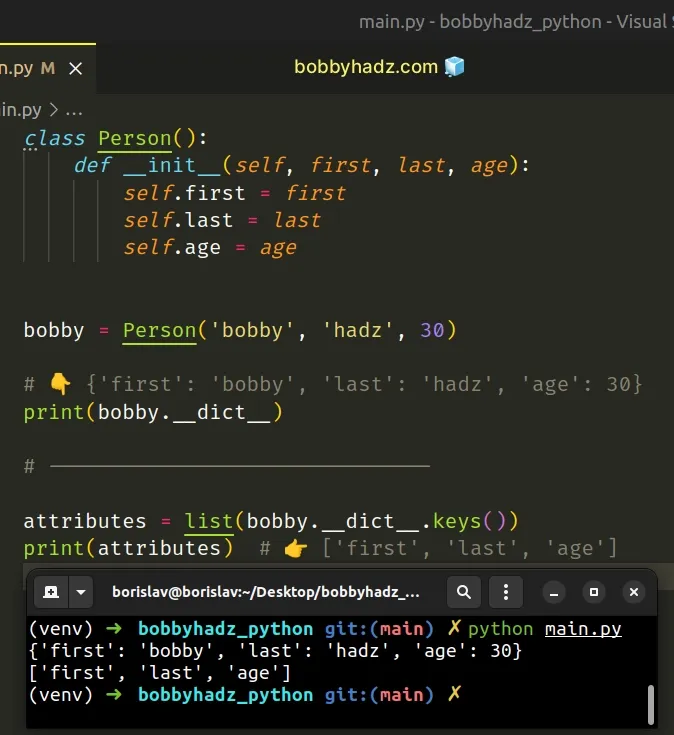
The dir() function takes an object and returns a list containing the object's attributes.
# Pretty print the object's attributes using pprint()
If you need to pretty print the attributes of the object, use the pprint()
method.
from pprint import pprint class Person(): def __init__(self, first, last, age): self.first = first self.last = last self.age = age bobby = Person('bobby', 'hadz', 30) # ['__class__', # '__delattr__', # '__dict__', # '__dir__', # '__doc__', # ... # ] pprint(dir(bobby))
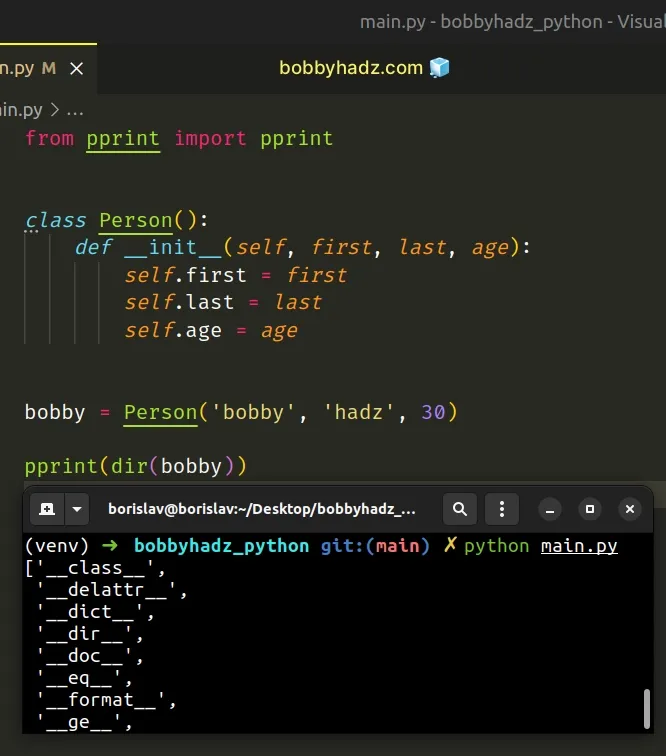
The pprint.pprint() method prints the formatted representation of an object.
# Get each attribute and its value
If you need to get each attribute and its value, use the getattr() function.
class Person(): def __init__(self, first, last, age): self.first = first self.last = last self.age = age bobby = Person('bobby', 'hadz', 30) for attribute in dir(bobby): print(attribute, getattr(bobby, attribute))
The getattr() function returns the value of the provided attribute of the object.
The function takes the object, the name of the attribute and a default value for when the attribute doesn't exist on the object as parameters.
# Get an object's properties and values using __dict__
If you need to get an object's properties and values, use the __dict__
attribute.
class Person(): def __init__(self, first, last, age): self.first = first self.last = last self.age = age bobby = Person('bobby', 'hadz', 30) # 👇️ {'first': 'bobby', 'last': 'hadz', 'age': 30} print(bobby.__dict__) # ------------------------------- attributes = list(bobby.__dict__.keys()) print(attributes) # 👉️ ['first', 'last', 'age'] # ------------------------------- values = list(bobby.__dict__.values()) print(values) # 👉️ ['bobby', 'hadz', 30]
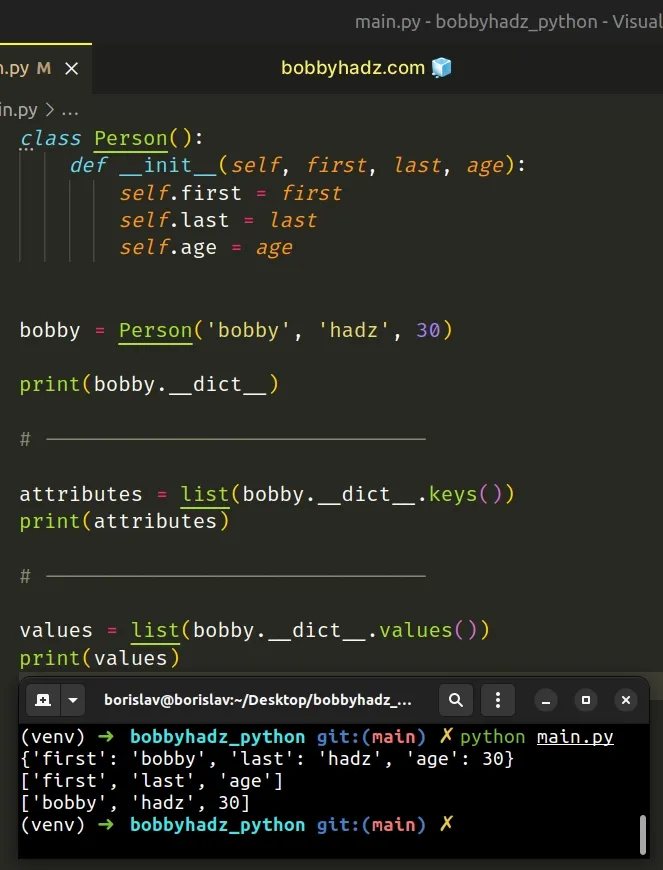
__dict__ attribute returns a dictionary containing the object's properties and values.You can use the dict.keys() and dict.values() methods if you only need the
object's attribute or values.
# Format the object's attributes into a string
If you need to format the object's attributes into a string, use the
str.join() method and a
formatted string literal.
class Person(): def __init__(self, first, last, age): self.first = first self.last = last self.age = age bobby = Person('bobby', 'hadz', 30) # 👇️ dict_items([('first', 'bobby'), ('last', 'hadz'), ('age', 30)]) print(bobby.__dict__.items()) result = ', '.join(f'{key}={str(value)}' for key, value in bobby.__dict__.items()) print(result) # 👉️ first=bobby, last=hadz, age=30
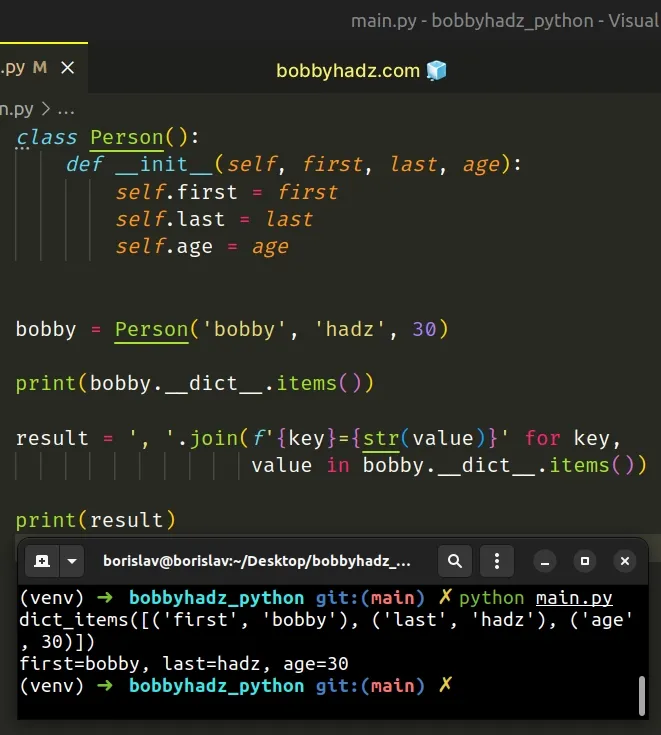
The str.join() method takes an iterable as an argument and returns a string which is the concatenation of the strings in the iterable.
The string the method is called on is used as the separator between the elements.
Formatted string literals (f-strings) let us include expressions inside of a
string by prefixing the string with f.
var1 = 'bobby' var2 = 'hadz' result = f'{var1}{var2}' print(result) # 👉️ bobbyhadz
Make sure to wrap expressions in curly braces - {expression}.
# Get an object's attributes using vars()
Alternatively, you can use vars().
The vars() function returns a dictionary containing the object's properties
and values.
class Employee(): def __init__(self, id, name, salary): self.id = id self.name = name self.salary = salary bob = Employee(1, 'bobbyhadz', 100) # 👇️ {'id': 1, 'name': 'bobbyhadz', 'salary': 100} print(vars(bob)) only_attributes = list(vars(bob).keys()) print(only_attributes) # 👉️ ['id', 'name', 'salary'] only_values = list(vars(bob).values()) print(only_values) # 👉️ [1, 'bobbyhadz', 100]
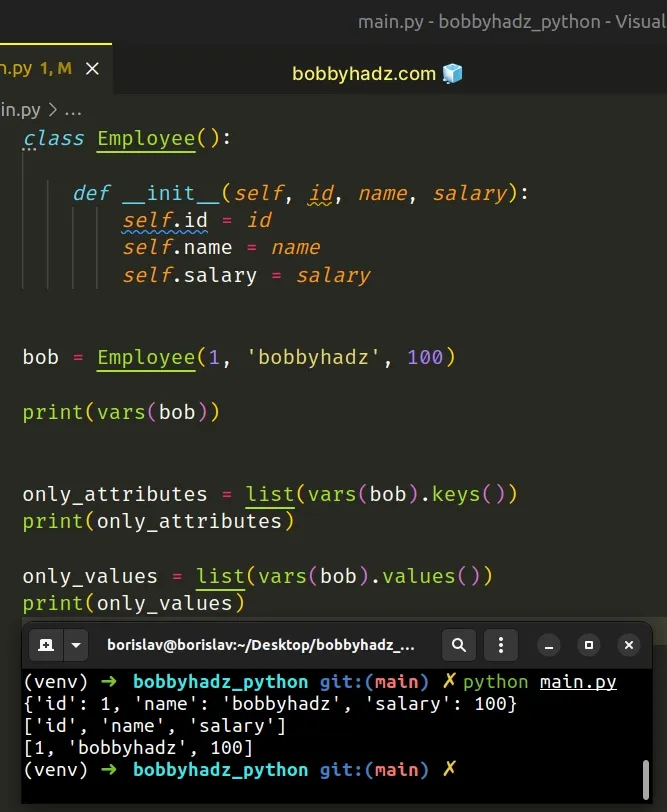
The vars function takes
an object and returns the __dict__ attribute of the given module, class,
instance or any other object that has a __dict__ attribute.
The vars() function raises a TypeError if the provided object doesn't have a
__dict__ attribute.
Which approach you pick is a matter of personal preference. I'd use the
__dict__ attribute directly to be more explicit.
# Get all methods of a given class in Python
Use the inspect.getmembers() method to get all methods of a class.
The getmembers() method will return a list containing all of the methods of
the class.
import inspect class Employee(): def __init__(self, name, salary): self.salary = salary self.name = name def get_name(self): return self.name def get_salary(self): return self.salary # ✅ called inspect.getmembers with the class itself list_of_methods = inspect.getmembers(Employee, predicate=inspect.isfunction) # 👇️ [('__init__', <function Employee.__init__ at 0x7f91845bdab0>), ('get_name', <function Employee.get_name at 0x7f9184696e60>), ('get_salary', <function Employee.get_salary at 0x7f9184696ef0>)] print(list_of_methods) # ------------------------------------------------------------------ bob = Employee('Bobbyhadz', 100) # ✅ called inspect.getmembers with instance of the class list_of_methods = inspect.getmembers(bob, predicate=inspect.ismethod) # 👇️ [('__init__', <bound method Employee.__init__ of <__main__.Employee object at 0x7fca7bac09d0>>), ('get_name', <bound method Employee.get_name of <__main__.Employee object at 0x7fca7bac09d0>>), ('get_salary', <bound method Employee.get_salary of <__main__.Employee object at 0x7fca7bac09d0>>)] print(list_of_methods)
We used the inspect.getmembers() method to get a list containing all of the
methods of a class.
The inspect.getmembers() method takes an object and returns all the members of the object in a list of tuples.
The first element in each tuple is the name of the member and the second is the value.
predicate argument to inspect.function to get a list containing only the methods of the class.# Passing an instance of the class to inspect.getmembers()
The inspect.getmembers() method can also be passed an instance of a class, but
you have to change the predicate to inspect.ismethod.
import inspect class Employee(): def __init__(self, name, salary): self.salary = salary self.name = name def get_name(self): return self.name def get_salary(self): return self.salary bob = Employee('Bobbyhadz', 100) list_of_methods = inspect.getmembers(bob, predicate=inspect.ismethod) # [('__init__', <bound method Employee.__init__ of <__main__.Employee object at 0x7fca7bac09d0>>), ('get_name', <bound method Employee.get_name of <__main__.Employee object at 0x7fca7bac09d0>>), ('get_salary', <bound method Employee.get_salary of <__main__.Employee object at 0x7fca7bac09d0>>)] print(list_of_methods)
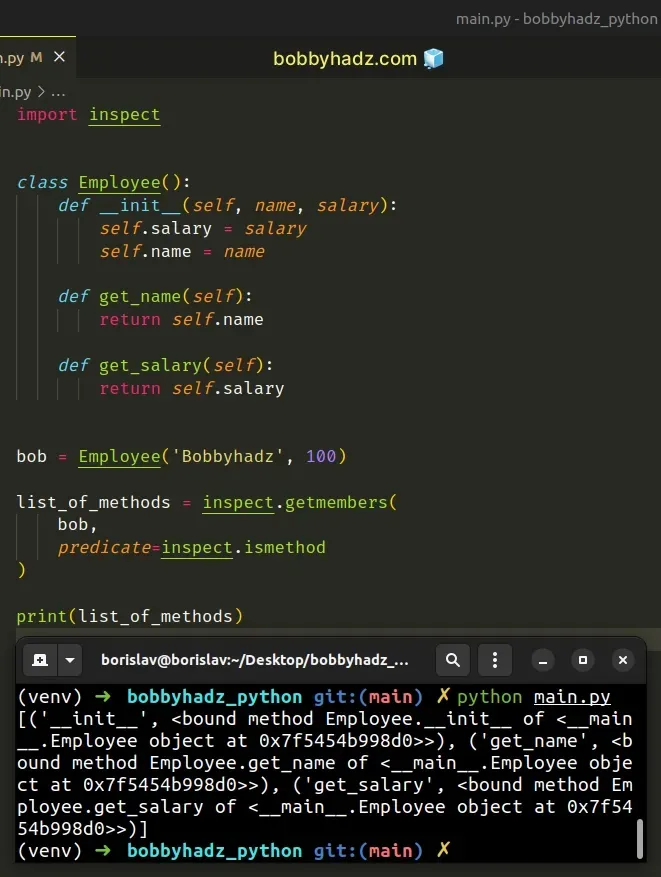
The
inspect.isfunction()
predicate returns True if the object is a Python function.
The
inspect.ismethod
predicate returns True if the object is a bound method written in Python.
inspect.isfunction when passing a class to theinspect.getmembers() method and inspect.ismethod when passing an instance to getmembers().Alternatively, you can use the dir() function.
# Get all methods of a given class using dir()
This is a three-step process:
- Use the
dir()function to get a list of the names of the class's attributes. - Use a list comprehension to filter out the attributes that start with a double underscore and all non-methods.
- The list will only contain the class's methods.
class Employee(): def __init__(self, name, salary): self.salary = salary self.name = name def get_name(self): return self.name def get_salary(self): return self.salary class_methods = [method for method in dir(Employee) if not method.startswith('__') and callable(getattr(Employee, method)) ] print(class_methods) # 👉️ ['get_name', 'get_salary']
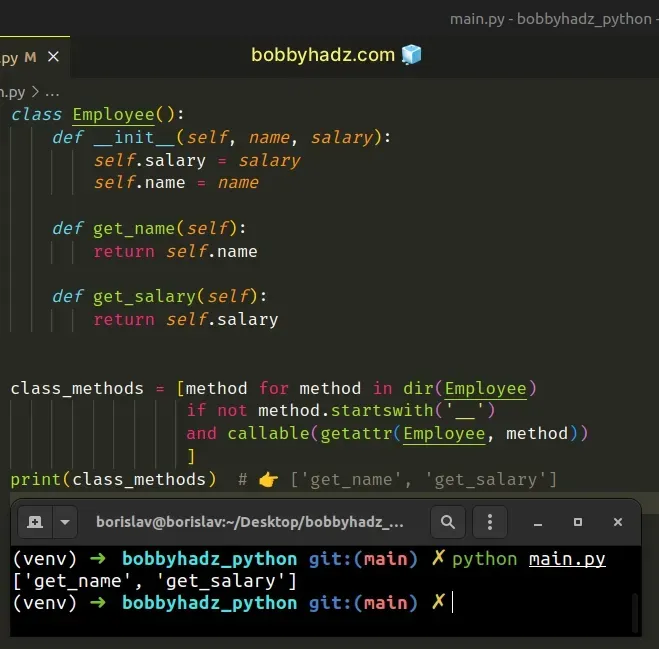
Filtering out the attributes that start with two underscores is optional.
Make sure to remove the condition if you need to keep method names that start with two underscores.
class_methods = [method for method in dir(Employee) if callable(getattr(Employee, method)) ] # ['__class__', '__delattr__', '__dir__', '__eq__', '__format__', '__ge__', '__getattribute__', '__gt__', '__hash__', '__init__', '__init_subclass__', '__le__', '__lt__', '__ne__', '__new__', '__reduce__', '__reduce_ex__', '__repr__', '__setattr__', '__sizeof__', '__str__', '__subclasshook__', 'get_name', 'get_salary'] print(class_methods)
The class_methods list contains all the method names of the class.
# Getting all methods of an instance with dir()
You can also use this approach to get all methods of an instance.
class Employee(): def __init__(self, name, salary): self.salary = salary self.name = name def get_name(self): return self.name def get_salary(self): return self.salary bob = Employee('Bobbyhadz', 100) class_methods = [method for method in dir(bob) if not method.startswith('__') and callable(getattr(bob, method)) ] print(class_methods) # 👉️ ['get_name', 'get_salary']
You can use the getattr function if you need to call some of the methods.
bob = Employee('Bobbyhadz', 100) class_methods = [method for method in dir(bob) if not method.startswith('__') and callable(getattr(bob, method)) ] print(class_methods) # 👉️ ['get_name', 'get_salary'] method_1 = getattr(bob, class_methods[0]) print(method_1()) # 👉️ Bobbyhadz
The getattr() function returns the value of the provided attribute of the object.
The function takes the object, the name of the attribute and a default value for when the attribute doesn't exist on the object as parameters.
# Additional Resources
You can learn more about the related topics by checking out the following tutorials:

